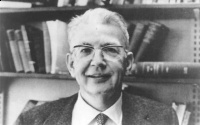Ronald Coase
 | |
| Born |
December 29, 1910 Willesden, Middlesex, England, United Kingdom |
|---|---|
The child of two Post Office telegraphers, Coase had overcome an early assessment of physical disability--as a young child he wore iron casts on his legs--to win a scholarship at a grammar school. By the time he left, he was already enrolled in extramural courses at the University of London. He was set on pursuing a degree in the London School of Economics's commerce program, and his early socialist convictions did not survive the encounter with Arnold Plant and his group. He heard Hayek too, and found his explanation for the economic slump of 1929 "magical". Plant encouraged him to examine the key question of the day: the nature of public corporations. Coase began with the Post Office, and in particular the broadcasting monopoly. He then spent about a decade researching the BBC. He focused squarely on the monopoly, investigating how it had come about, its effects on rivals (relay and commercial stations), and its public reputation. The project was entirely a product of the intellectual culture of the LSE: it was undertaken there, funded by the School, and initially published in parts in Economica. In 1950, the School was also responsible for publishing the resulting book, British Broadcasting: A Study in Monopoly, which blew open the simmering controversy over broadcasting and politics, with consequences that were last for decades.[1]
Coase eviscerated every argument for the broadcasting monopoly based on physics, technology, or economics. He had insisted that the real reasons for the monopoly's creation had been cultural and moral, not to say moralistic. The Continental broadcasters (obliterated by the war) and the relay industry proved in his portrayal a diverse, dynamic, and unpredictable economy of listeners. And he drew much the same message as Hayek, that central planning was a step to totalitarian rule. His analysis rapidly became second nature to economic liberals. Selwyn Lloyd's dissent from the Beveridge Report, in particular, certainly echoed Coase in both argument and language.[2]
Coase left for the United States in 1951, eventually to end up in Chicago and win a Nobel Prize. But back in the UK his British Broadcasting had already become the Road to Serfdom of the modern media.[3]
Coase is also often referred to as the "father" of reform in the policy for allocation of the electromagnetic spectrum, based on his article "The Federal Communications Commission" (1959), where he criticizes spectrum licensing, suggesting property rights as a more efficient method of allocating spectrum to users.[4]
Notes
- ↑ Johns, Adrian (2010). Death of a Pirate: British Radio and the Making of the Information Age. W. W. Norton & Company, pp 96-97.
- ↑ Johns, p 99
- ↑ Johns, p 102
- ↑ Wikipedia, "Ronald Coase"